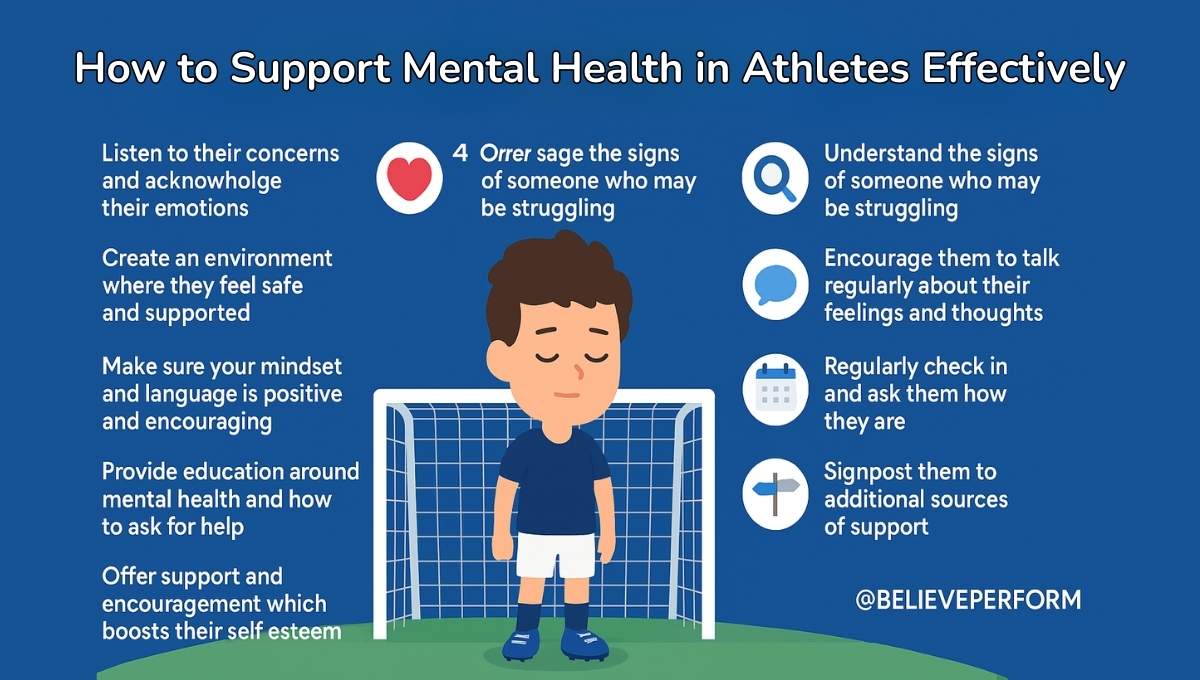How to Support Mental Health in Athletes Effectively
The Hidden Struggles Behind the Spotlight
Athletes often appear invincible—physically strong, mentally tough, and relentlessly driven. Yet, beneath the surface, many grapple with significant mental health challenges. From performance anxiety and injury-related stress to post-career identity crises, the pressures are immense. Recent tragedies in professional sports, such as the suicides of former AFL players Adam and Troy Selwood, underscore the urgent need to address mental health in athletes.
This article explores effective strategies to support mental health in athletes, emphasizing the importance of proactive measures, open communication, and comprehensive support systems.
Understanding the Unique Mental Health Challenges Athletes Face
Performance, Pressure, and Perfectionism
Athletes are frequently subjected to enormous expectations from fans, coaches, and even themselves. This constant pressure can lead to perfectionist thinking and high anxiety. The drive to succeed and fear of failure can push athletes toward chronic stress, burnout, and mental fatigue. NBA player Tyrese Haliburton recently shared his experiences with anxiety and depression, revealing how external pressures and injuries took a toll on his well-being.
Injury and Recovery
Injuries not only affect an athlete’s physical capabilities but also their mental state. Recovery periods often involve isolation from the team, uncertainty about returning to form, and fear of re-injury. This can lead to depressive symptoms, feelings of helplessness, and reduced self-worth. Athletes may struggle silently during rehabilitation, making it vital to provide emotional and psychological support during these times.
Transitioning Out of Sports
Leaving the game—whether due to retirement or injury—can create a deep sense of loss. Many athletes tie their identity to their sport, and without it, they may feel aimless or unrecognized. The lack of purpose post-career is a critical time when athletes are particularly vulnerable to mental health issues. The AFL’s recent losses highlight the importance of supporting players during these transitions.
Key Strategies to Support Mental Health in Athletes
1. Foster Open Communication
A culture of open and honest dialogue is essential. When athletes feel safe to talk about their struggles, it becomes easier to identify early warning signs of mental health issues. Coaches and support staff should normalize discussions around mental health, actively listen without judgment, and respond with empathy. Encouraging vulnerability helps remove the stigma and creates a supportive team atmosphere.
2. Integrate Mental Health Education
Education plays a powerful role in prevention. By educating athletes about the signs and symptoms of common mental health challenges, teams can equip them with the tools to manage stress and seek help early. The NCAA provides educational resources to promote awareness and resilience among athletes. Workshops and talks by professionals can further reinforce these lessons.
3. Provide Access to Professional Support
Mental health professionals should be an integral part of every sports organization. Just as athletes receive regular physical check-ups, mental health support should be normalized and easily accessible. Resources like the U.S. Center for Mental Health & Sport offer specialized services and training to help athletes maintain psychological well-being.
4. Encourage Peer Support Programs
Peer-led initiatives can be incredibly powerful. Hearing from fellow athletes who have navigated mental health challenges helps others feel less alone. Programs like Athletes for Hope’s Whole Being Athlete initiative promote peer storytelling and mental health advocacy among athletes. These programs foster a sense of solidarity and mutual support.
5. Implement Mindfulness and Stress-Reduction Techniques
Mindfulness practices such as deep breathing, meditation, visualization, and positive self-talk have proven benefits in managing stress and improving focus. When incorporated into daily routines, these practices can enhance mental resilience and athletic performance. Sports bodies like the NFL actively promote such strategies among their athletes.
Traditional vs. Holistic Approaches to Mental Health in Sports
In traditional sports environments, the primary focus tends to be on physical performance, with limited consideration for mental health. Support systems are often minimal, and discussions about mental struggles may be discouraged or overlooked.
By contrast, a holistic approach values both physical and mental well-being. It involves a broader support network that includes psychologists, counselors, and peer mentors. Education is extended beyond tactical skills to encompass mental health awareness and coping strategies. This integrated model not only supports athletes in the present but also lays the foundation for long-term development, resilience, and life beyond sports.
FAQs
What are the common signs of mental health issues in athletes?
Signs include mood swings, withdrawal from teammates, sudden drops in performance, trouble sleeping, irritability, and loss of enthusiasm for the sport.
How can coaches support athletes' mental health?
Coaches can provide emotional support by fostering open dialogue, encouraging rest and recovery, and referring athletes to professional help when needed.
Are there specific programs for youth athletes?
Yes, programs such as UW Medicine’s Mentally Strong initiative equip coaches with the tools to support high school athletes' mental well-being.
How does mental health impact athletic performance?
Mental health directly affects focus, confidence, and motivation. Poor mental well-being can lead to fatigue, slower recovery times, and increased risk of injury, while strong mental health promotes resilience and better overall performance.
Conclusion: Prioritizing Mental Health in Athletes
Supporting mental health in athletes is not an optional add-on—it’s essential for their success and longevity, both on and off the field. When we prioritize open communication, access to care, mental health education, and peer support, we create a foundation where athletes can thrive holistically.
Let’s move beyond just celebrating physical victories. By championing mental health in athletes, we ensure they feel valued, supported, and equipped for every stage of their journey.

